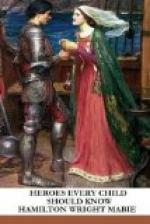When Roland saw that the Archbishop was dead, his heart was sorely troubled in him. Never did he feel a greater sorrow for comrade slain, save Oliver only. “Charles of France,” he said, “come as quickly as you may, many a gallant knight have you lost in Roncesvalles. But King Marsilas, on his part, has lost his army. For one that has fallen on this side there has fallen full forty on that.” So saying he turned to the Archbishop; he crossed the dead man’s hands upon his breast and said, “I commit thee to the Father’s mercy. Never has man served his God with a better will, never since the beginning of the world has there lived a sturdier champion of the faith. May God be good to you and give you all good things!”
Now Roland felt that his own death was near at hand. In one hand he took his horn, and in the other his good sword Durendal, and made his way the distance of a furlong or so till he came to a plain, and in the midst of the plain a little hill. On the top of the hill in the shade of two fair trees were four marble steps. There Roland fell in a swoon upon the grass. There a certain Saracen spied him. The fellow had feigned death, and had laid himself down among the slain, having covered his body and his face with blood. When he saw Roland, he raised himself from where he was lying among the slain and ran to the place, and, being full of pride and fury, seized the Count in his arms, crying aloud, “He is conquered, he is conquered, he is conquered, the famous nephew of King Charles! See, here is his sword; ’tis a noble spoil that I shall carry back with me to Arabia.” Thereupon he took the sword in one hand, with the other he laid hold of Roland’s beard. But as the man laid hold, Roland came to himself, and knew that some one was taking his sword from him. He opened his eyes but not a word did he speak save this only, “Fellow, you are none of ours,” and he smote him a mighty blow upon his helmet. The steel he brake through and the head beneath, and laid the man dead at his feet. “Coward,” he said, “what made you so bold that you dared lay hands on Roland? Whosoever knows him will think you a fool for your deed.”
And now Roland knew that death was near at hand. He raised himself and gathered all his strength together—ah me! how pale his face was!—and took in his hand his good sword Durendal. Before him was a great rock and on this in his rage and pain he smote ten mighty blows. Loud rang the steel upon the stone; but it neither brake nor splintered. “Help me,” he cried, “O Mary, our Lady. O my good sword, my Durendal, what an evil lot is mine! In the day when I must part with you, my power over you is lost. Many a battle I have won with your help; and many a kingdom have I conquered, that my Lord Charles possesses this day. Never has any one possessed you that would fly before another. So long as I live, you shall not be taken from me, so long have you been in the hands of a loyal knight.”




